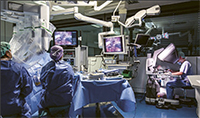Modern Therapies for Prostate Cancer

Prostate cancer is the most common tumor in men and is more likely to occur with increasing age. But thanks to innovative therapy methods, chances of recovery are good. At the Medical Center – University of Freiburg, doctors and researchers fight prostate cancer with everything that modern medicine has to offer.
Safe robot and image-based diagnosis
In addition to conventional ultrasound images, doctors at the Department of Urology use data from other imaging methods such as magnetic resonance imaging (MRT) for biopsies. The fused 3-D real-time ultrasound image of the prostate allows for a better assessment of the position, size and activity of the abnormal tissue. The biopsy needle is inserted using a robot and allows for samples to be taken with millimeter precision.
Modern surgical procedures
One possible surgical treatment for prostate cancer is the complete removal of the prostate. For around two years now, the Department of Urology led by Medical Director Professor Dr. Christian Gratzke has been operating patients using minimally invasive methods and particularly gently using a computer-assisted robot system. The currently most modern surgical robot DaVinci consists of several finely movable arms that are controlled by the surgeon via a console and make precise small cuts possible. The surgeon maintains an overview thanks to a controllable video system that delivers high-resolution and greatly enlarged 3-D images.
Personalized radiation therapy
By irradiating prostate cancer, radiation oncologists can destroy cancer cells. So far, the majority of patients receives radiation treatment of the entire prostate for seven to eight weeks. The HypoFocal study is investigating whether patients benefit from individually tailored stereotactic high-precision radiation therapy that is only used for five days. The suspicious tissue is localized with the help of MRI and positron emission tomography (PET / CT) and irradiated with higher doses in a targeted manner. In this way, adjacent healthy tissue should be spared. Professor Dr. Anca-Ligia Grosu, Medical Director of the Department of Radiation Oncology, coordinates the project, which is funded by the Federal Ministry of Education and Research as part of the National Decade against Cancer.
Epigenetic stop switch
Where previously established therapies prove to be ineffective, epigenetics could offer a new treatment approach, especially for hormone-resistant tumors. In 2019, a team of researchers led by Professor Dr. Roland Schüle, Scientific Director of the Department of Urology and the Center for Clinical Research, developed a new enzyme that controls the activity of genes. If the scientists blocked the production of this enzyme (KMT9) in the laboratory, the growth of therapy-resistant prostate cancer cells was inhibited whereas healthy cells survived. The scientists are currently working on a drug with the same effect.
Radiomics: Using image information that is hidden to the eye
In order to be able to make greater use of medical image data in the future, scientists are developing automated evaluation methods for biomedical image data. The Radiomics priority program is funded by the German Research Foundation for three years with more than eight million Euro. It is coordinated by Professor Dr. Fabian Bamberg, Medical Director of the Center for Diagnostic and Therapeutic Radiology. In the future, changes in tissue structures of the prostate could be discovered faster and more precisely with the help of artificial intelligence and IT-supported data processing.
Back